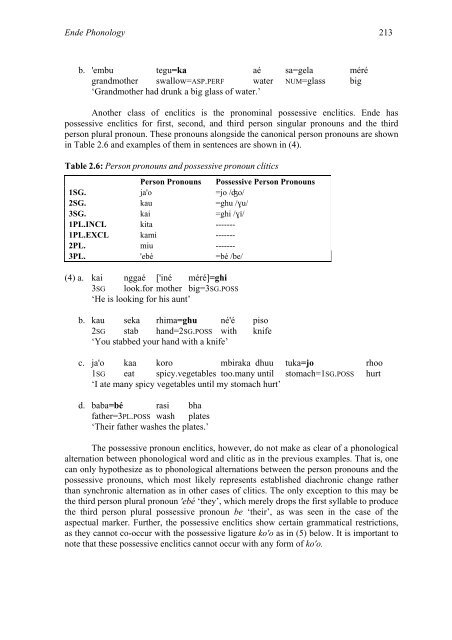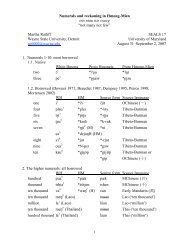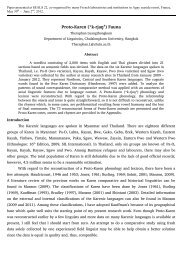proto-southwestern-tai revised: a new reconstruction - seals 22
proto-southwestern-tai revised: a new reconstruction - seals 22
proto-southwestern-tai revised: a new reconstruction - seals 22
You also want an ePaper? Increase the reach of your titles
YUMPU automatically turns print PDFs into web optimized ePapers that Google loves.
Ende Phonology 213<br />
b. 'embu tegu=ka aé sa=gela méré<br />
grandmother swallow=ASP.PERF water NUM=glass big<br />
‘Grandmother had drunk a big glass of water.’<br />
Another class of enclitics is the pronominal possessive enclitics. Ende has<br />
possessive enclitics for first, second, and third person singular pronouns and the third<br />
person plural pronoun. These pronouns alongside the canonical person pronouns are shown<br />
in Table 2.6 and examples of them in sentences are shown in (4).<br />
Table 2.6: Person pronouns and possessive pronoun clitics<br />
Person Pronouns Possessive Person Pronouns<br />
1SG. ja'o =jo /ʤo/<br />
2SG. kau =ghu /�u/<br />
3SG. kai =ghi /�i/<br />
1PL.INCL kita -------<br />
1PL.EXCL kami -------<br />
2PL. miu -------<br />
3PL. 'ebé =bé /be/<br />
(4) a. kai nggaé ['iné méré]=ghi<br />
3SG look.for mother big=3SG.POSS<br />
‘He is looking for his aunt’<br />
b. kau seka rhima=ghu né'é piso<br />
2SG stab hand=2SG.POSS with knife<br />
‘You stabbed your hand with a knife’<br />
c. ja'o kaa koro mbiraka dhuu tuka=jo rhoo<br />
1SG eat spicy.vegetables too.many until stomach=1SG.POSS hurt<br />
‘I ate many spicy vegetables until my stomach hurt’<br />
d. baba=bé rasi bha<br />
father=3PL.POSS wash plates<br />
‘Their father washes the plates.’<br />
The possessive pronoun enclitics, however, do not make as clear of a phonological<br />
alternation between phonological word and clitic as in the previous examples. That is, one<br />
can only hypothesize as to phonological alternations between the person pronouns and the<br />
possessive pronouns, which most likely represents established diachronic change rather<br />
than synchronic alternation as in other cases of clitics. The only exception to this may be<br />
the third person plural pronoun 'ebé ‘they’, which merely drops the first syllable to produce<br />
the third person plural possessive pronoun be ‘their’, as was seen in the case of the<br />
aspectual marker. Further, the possessive enclitics show cer<strong>tai</strong>n grammatical restrictions,<br />
as they cannot co-occur with the possessive ligature ko'o as in (5) below. It is important to<br />
note that these possessive enclitics cannot occur with any form of ko'o.





